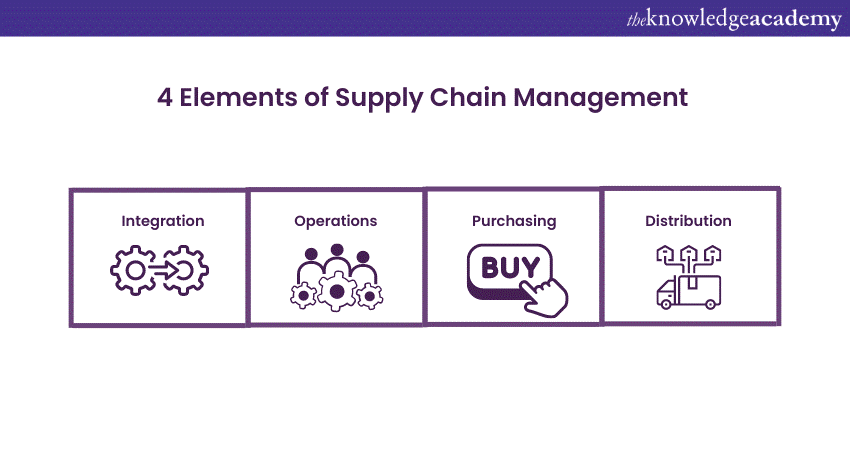1. Introduction
Efficient supply chain management involves overseeing the entire manufacturing process, from sourcing raw materials to delivering the final product to customers. By effectively managing the four elements of supply chain management – integration, operations, purchasing, and distribution – businesses can gain a competitive edge. Let’s take a closer look at each of these elements and how they contribute to a well-functioning supply chain.
2. Integration
Integration is a key component of successful supply chain management. It involves seamless communication and collaboration between all parties involved in the supply chain. By integrating different divisions and combining their expertise, businesses can eliminate errors, save costs, and improve overall efficiency.

The Power of Collaboration
In a highly interconnected business environment, collaborating with stakeholders is crucial. By fostering open lines of communication and collaboration, businesses can optimize their supply chain processes. This ensures that all parties are aligned and working towards a common goal.
Building Integrated Teams
Integrating teams within the supply chain allows for better coordination and monitoring of operations. When teams are integrated, it becomes easier to identify areas for improvement and implement changes. This leads to enhanced efficiency and performance, ultimately driving better business outcomes.
Streamlining Operations through Integration
Integrating various supply chain processes enables managers to monitor operations more effectively. By having a holistic view of the entire supply chain, managers can identify bottlenecks, streamline processes, and optimize resource allocation. This results in improved overall operations and a competitive advantage.
3. Operations
The operations element of supply chain management is the backbone of the entire process. It involves overseeing day-to-day activities to ensure that all supply chain phases stay on track. By adopting lean manufacturing strategies and continuously evaluating processes, businesses can achieve greater efficiency and effectiveness.
The Backbone of Supply Chain Management
Operations play a pivotal role in ensuring that the entire supply chain functions smoothly. Managers closely monitor operations to identify any deviations from plans and take corrective actions promptly. This ensures that production remains on schedule and customer demands are met.
Embracing Lean Manufacturing Strategies
Many businesses today have embraced lean manufacturing strategies to optimize their operations. Lean manufacturing involves continuously evaluating processes to identify areas for improvement. By eliminating waste and streamlining workflows, businesses can achieve significant cost savings and improve overall efficiency.
Continuously Improving Efficiency
The operations team plays a crucial role in identifying opportunities for improvement within the supply chain. By monitoring equipment performance, ensuring optimal resource utilization, and identifying areas where manpower can be reduced, the operations team can make substantial improvements to the supply chain system.
4. Purchasing
Purchasing is a critical aspect of supply chain management. It involves making informed decisions about which goods to procure, ensuring that the right materials, supplies, tools, or equipment are available when needed. Effective purchasing practices are essential to prevent production delays and maintain a robust supply chain.
The Art of Procurement
Knowing what goods your company needs and when is vital for efficient supply chain management. This requires a strategic approach to purchasing, taking into account factors such as quality, cost, and supplier reliability. By establishing strong relationships with suppliers and understanding market trends, businesses can make informed purchasing decisions.
Strategic Purchasing Decisions
Hiring qualified purchasing personnel is crucial to ensure that procurement processes are executed effectively. These professionals are responsible for evaluating suppliers, negotiating contracts, and managing inventory levels. Having the right people in these roles can significantly impact a company’s bottom line and overall supply chain performance.
Effective Inventory Management
Maintaining optimal inventory levels is essential to prevent stockouts or overstocking. Effective inventory management ensures that production is not disrupted due to material shortages. By leveraging technology and data-driven insights, businesses can optimize inventory levels, reduce carrying costs, and improve overall supply chain efficiency.
5. Distribution

The final element of supply chain management is distribution. It involves planning and executing the delivery of products to customers. An effective distribution strategy ensures that products reach their final destination efficiently and on time, enhancing customer satisfaction.
Planning for Success
Successful distribution requires careful planning and coordination. Businesses need to consider factors such as transportation, warehousing, and order fulfillment. By leveraging logistics software or outsourcing to third-party logistics (3PL) companies, businesses can optimize their distribution processes and ensure timely delivery.
Implementing Logistics Solutions
Logistics software plays a vital role in managing the complexities of distribution. It enables businesses to track shipments, optimize routes, and ensure efficient use of transportation resources. By leveraging technology, businesses can streamline their distribution operations and reduce costs.
Enhancing Customer Satisfaction
Efficient distribution is crucial for maintaining strong customer relationships. When products are delivered on time and in good condition, customer satisfaction increases. By continuously evaluating and improving distribution processes, businesses can enhance customer experiences and gain a competitive advantage.
6. The Benefits of Strong Supply Chain Management
An effective supply chain management strategy offers numerous benefits for businesses. These include:
-
Cost savings through improved efficiency and reduced waste.
-
Enhanced customer satisfaction by meeting demand and delivering products on time.
-
Increased agility to adapt to changing market conditions.
-
Improved collaboration and communication with stakeholders.
-
Better risk management and mitigation.
-
Enhanced visibility into the supply chain, enabling proactive decision-making.
By focusing on the four elements of supply chain management – integration, operations, purchasing, and distribution – businesses can unlock these benefits and position themselves for long-term success.
7. The Role of Outsourcing in Supply Chain Management
Managing a complex supply chain can be challenging, especially for smaller businesses. Outsourcing supply chain management to a third-party logistics (3PL) company can alleviate this burden and provide numerous benefits. A 3PL partner can bring expertise, resources, and technology to streamline supply chain operations, allowing businesses to focus on core competencies and strategic initiatives.
8. NewStream Enterprises, LLC: Your Supply Chain Management Partner
When it comes to efficient supply chain management, partnering with a trusted provider can make all the difference. NewStream Enterprises, LLC offers comprehensive supply chain management solutions, managing all aspects from procurement to fulfillment. With NewStream’s expertise and technology-driven approach, businesses can optimize their supply chain, reduce stress, and improve overall performance.

9. Conclusion
In conclusion, effective supply chain management is critical for businesses to thrive in today’s competitive landscape. By understanding and optimizing the four elements of supply chain management – integration, operations, purchasing, and distribution – businesses can achieve cost-effective operations, meet customer demands, and drive business success. Whether through internal efforts or outsourcing to a trusted partner like NewStream Enterprises, LLC, prioritizing supply chain management is essential for long-term growth and profitability.
